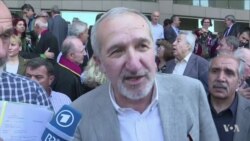A report from Amnesty International accuses Turkey of conducting a sustained, escalating crackdown that has left swaths of society in a state of constant fear.
The report, Weathering the Storm: Defending Human Rights in Turkey's Climate of Fear, says the state of emergency, imposed in July 2016 after a coup attempt, has resulted in mass arrests and dismissals and the silencing of human rights defenders through threats, harassment and imprisonment.
Amnesty says Turkey's free media are among those on the front line of the battle for human rights.
"At any one time since the coup attempt in Turkey, there's been no less than 120 media workers and journalists in prison," Amnesty's Turkey campaigner, Milena Buyum, told VOA. "Anti-terrorism laws are being used to silence journalists and kill off independent journalism in Turkey."
Journalists sentenced
Recent trials have targeted one of the last remaining independent newspapers, Cumhuriyet. Its chairman, Akin Atalay, is among 13 journalists handed multiple sentences for "aiding and abetting terror organizations." All have been released pending appeal.
"I am currently free, but it is not over. This protest, these guardians of justice, have one more member now, but others will join. We will become a big crowd," Atalay told reporters at a demonstration following his release Thursday. He had spent 500 days behind bars.
Turkey's state of emergency was renewed for a seventh time several days ago.
"It's just simply giving carte blanche to the government and the authorities to implement draconian measures that limit rights of pretty much everybody," Buyum said.
She added that much of Turkey's once vibrant civil society has been silenced. Public gatherings have been banned; more than 100,000 people have faced criminal investigations, 50,000 have been imprisoned pending trial; and more than 107,000 public sector employees have been fired. Several Amnesty International workers are among the human rights activists behind bars.
Twitter post purs probe
More than 800 people were detained for expressing opposition to the recent Turkish military offensive in Afrin, Syria. One activist, Ali Erol, faces a criminal investigation for "terrorist propaganda" over a Twitter post of an olive branch next to anti-war hashtags.
"Human rights defenders need our support and solidarity. They need states with influence on Turkey to speak out," Buyum said.
Amnesty's report follows strong criticism from the United Nations and the European Union over the state of human rights in Turkey.
The government has repeatedly said its actions are vital to target what it calls terrorist organizations and those working against the Turkish state. It blames a U.S.-based cleric, Fethullah Gülen, for the 2016 coup attempt — a charge he has denied.
Opponents of President Recep Tayyip Erdoğan fear that the snap elections called for this June will hand him even greater executive powers and that the crackdown could worsen.






